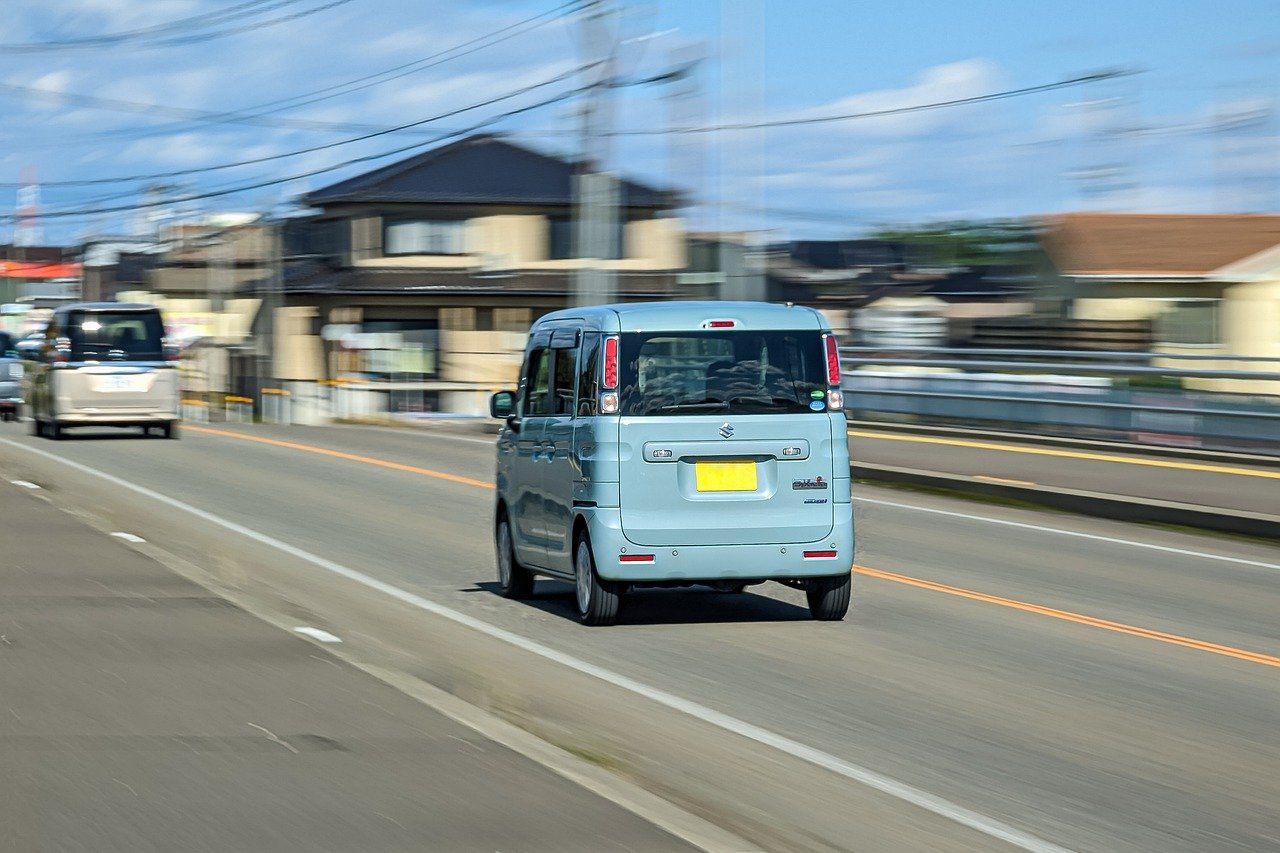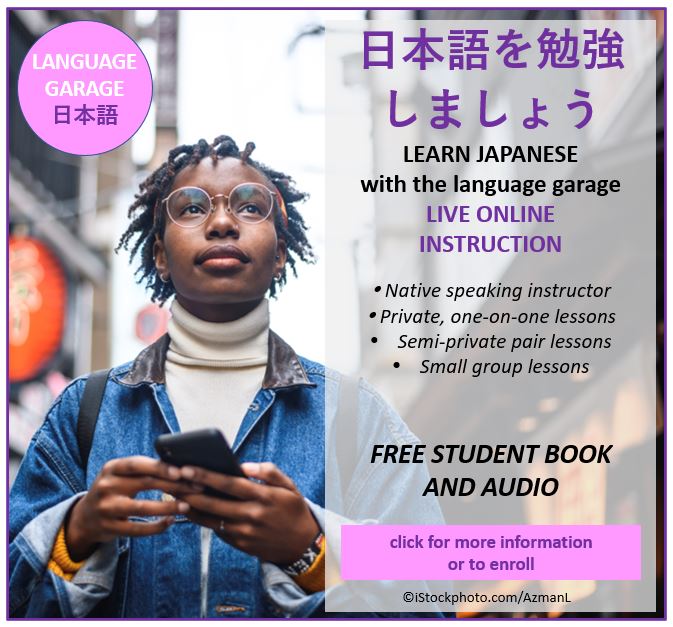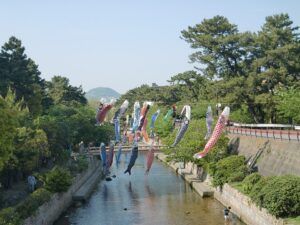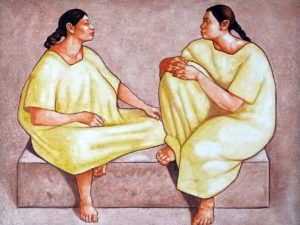Image by Johnny_px from Pixabay
In this post we’ll look at some Japanese vocabulary related to cars and driving.
私の車 watashi no kuruma My car
Let’s start with some basic vocabulary: 車 kuruma (car), 運転する untensuru (to drive), ガソリン gasorin (gas/petrol), ガソリンを入れる gasorin o ireru (to get gas), 満タンにする mantan ni suru (to fill the gas tank), シートベルト shītoberuto (seatbelt), 車庫 shako (garage), エンジンをかける enjin o kakeru (to start the car), 駐車する chūshasuru (to park the car), 駐車場 chūshajō (parking lot), 駐車スペース chūsha supēsu (parking space), エンジンを止める enjin o tomeru (to turn off the engine).
- 車がありますか。
Kuruma wa arimasu ka.
Do you have a car? - 新しい車を買いました。
Atarashī kuruma o kaimashita.
I bought a new car. - 毎週たくさん運転します。
Maishū takusan untenshimasu.
I drive a lot every week.
- シートベルをしてください。
Shītoberuto o shite kudasai.
Put on your seatbelt. - ガソリンを入れなければいけません。/給油しなければいけません。
Gasorin o irenakereba ikemasen./ Kyūyu shinakereba ikemasen.
I need to get gas. - 満タンにしてください。
Mantan ni shite kudasai.
Fill the tank, please. - 車庫に入れますか、それとも路上駐車しますか。
Shako ni iremasu ka, soretomo rojōchūsha shimasu ka.
Do you park in a garage or on the street? - 駐車スペースが見つかりません。
Chūsha supēsu ga mitsukarimasen.
I can’t find a parking space.
ドアを開けてください! Doa o akete kudasai! Unlock the car door!
Now let’s look at some vocabulary for parts of a car. 車のドア kuruma no doa (car door), フロントガラス furontogarasu (windshield), ワイパー waipā (windshield wipers), 窓を開ける/窓を閉める mado o akeru/mado o shimeru (to put up/down the window), トランク toranku (trunk/boot), ボンネット bon’netto (hood/bonnet), ハンドル handoru (steering wheel), 運転席 untenseki (driver’s seat), 助手席 joshuseki (passenger seat), 後部座席 kōbuzaseki (back seat),ヘッドライト heddoraito (headlights), ブレーキ burēki (brakes), エンジン enjin (engine), ウィンカー winkā (blinker, turn signal), ブレーキランプ burēki ranpu (brake lights), オイル交換をする oirukōkan o suru (to change the oil), 整備士 sēbishi (mechanic).
- トランクにスーツケースが入っています。
Toranku ni sūtsukēsu ga haitte imasu.
The suitcases are in the trunk. - 子供達は後部座席に座っています。
Kodomotachi wa kōbuzaseki ni suwatte imasu.
The kids are sitting in the back seat. - 寒いです!窓を閉めてヒーターをつけてください。
Samuidesu! Mado o shimete hītā o tsukete kudasai.
It’s cold! Put up the windows and turn on the heat. - 暑いです!窓を開けるかクーラーをつけてください。
Atsui desu! Mado o akeru ka kūrā o tsukete kudasai.
It’s hot! Open the windows or put the air conditioning on. - 雨が降っています。ワイパーを使わなければいけません。
Ame ga futte imasu. Waipā o tsukawanakereba ikemasen.
It’s raining. I need to put on the windshield wipers. - 暗いです。ヘッドライトをつけなければいけません。
Kurai desu. Heddoraito o tsukenakereba ikemasen.
It’s dark. I need to put on the headlights. - エンジンはボンネットの中です。
Enjin wa bon’netto no naka desu.
The engine is under the hood. - ブレーキを取り換えなければいけません。
Burēki o torikaenakereba ikemasen.
My car needs new brakes. - ウィンカーを出して次の角を曲がってください。
Winkā o dashite tsugi no kado o magatte kudasai.
Put on your blinker (turn signal) and turn at the next street. - オイル交換をしなければいけません。
Oirukōkan o shinakereba ikemasen.
I need to change the oil in my car. - 車の調子がおかしいです。整備士に見てもらわなければいけません。
Kuruma no chōshi ga okashī desu. Sēbishi ni mite morawanakereba ikemasen.
Something is wrong with my car. I need a mechanic.
信号を右に曲がってください。 Shingō o migi ni magatte kudasai. Turn right at the traffic light.
Now let’s see some vocabulary that describes what we do when we drive. まっすぐ行く massugu iku (to drive straight), 左に曲がる/右に曲がる hidari ni magaru/migi ni magaru (to turn left/right), バックする bakku suru (to reverse), ギアチェンジをする giachenji o suru (to change gears), 信号 shingō traffic light), 止まれの標識 tomare no hyōshiki (stop sign), 法定速度 hōtēsokudo (speed limit), クラクションを鳴らす kurakushon o narasu (to honk the horn),
- スピードを出し過ぎです。スピードを落としてください!
Supīdo o dashisugi desu. Supīdo o otoshite kudasai.
You’re driving too fast. Slow down! - スピードが遅すぎです。スピードを出してください!
Supīdo ga ososugi desu. Supīdo o dashite kudasai!
You’re driving too slowly. Speed up! - 法定速度は何ですか。
Hōtēsokudo wa nan desu ka.
What is the speed limit? - 次の信号を左に曲がってください。
Tsugi no shingō o hidari ni magatte kudasai.
Turn left at the next traffic light. - 止まれの標識です!止まってください!
Tomare no hyōshiki desu! Tomatte kudasai!
There’s a stop sign! Stop! - どうしてクラクションを鳴らしているのでしょうか。
Dōshite kurakushon o narashite iruno deshō ka.
Why is he honking his horn? - 駐車スペースから出て、走り去ってしまいました。
Chūsha supēsu kara dete, hashirisatte shimaimashita.
She reversed out of the parking spot and drove away.
道で Michi de: On the road
Now let’s look at some things you’re likely to see when you’re on the road. 道 michi (street), 高速道路 kōsokudōro (highway), 高速道路の出口 kōsokudōro no deguchi (highway exit), 高速道路に入る kōsokudōro ni hairu (to get on the highway), 料金所 ryōkinjo (toll booth), 橋 hashi (bridge), 道路標識 dōrohyōshiki (road sign), ロータリー rōtarī (traffic circle/roundabout), トラック torakku (truck), 追い越す oikosu (to pass a car), 車線 shasen (lane), ガソリンスタンド gasorinsutando (gas station), 交通渋滞 kōtsūjūtai (traffic jam), Xまで一時間かかります。/Xまで二時間かかります。 X made ichijikan kakarimasu./X made nijikan kakarimasu. (to take one hour/two hours to drive to X.)
- 高速道路へはどうやって行けばいいですか。
Kōsokudōro ewa dōyatte ikeba ii desu ka.
How do I get to the highway? - 次の出口で高速道路を降りてください。
Tsugi no deguchi de kōsokudōro o orite kudasai.
Get off the highway at the next exit. - 橋を越してから料金所があります。
Hashi o koshite kara ryōkinjo ga arimasu.
There’s a toll booth after the bridge. - あの標識には何と書いてありますか。
Ano hyōshiki niwa nan to kaite arimasu ka.
What does it say on that sign? - 一番近いガソリンスタンドはどこですか。
Ichiban chikai gasorinsutando wa doko desu ka.
Where is the nearest gas station? - この車は遅いです。追い越しましょう。
Kono kuruma wa osoi desu. Oikoshimashō.
This car is driving very slowly. Let’s pass it. - 車線変更しないでください。後ろにトラックがいますから。
Shasen henkō shinaide kudasai. Ushiro ni torakku ga imasu.
Don’t change lanes yet, there’s a truck behind you. - この時間は渋滞します。
Kono jikan wa jūtai shimasu.
Traffic is really bad this time of day. - 渋滞にはまりました。
Jūtai ni hamarimashita.
We’re stuck in a traffic jam. - 空港まで車でどのぐらいかかりますか。
Kūkō made kurmade dono gurai kakarimasu ka.
How long does it take to drive to the airport?
タイヤがパンクしました。 Taiya ga pankushimashita. I have a flat tire.
Sometimes things don’t always go perfectly well when we drive. 曲がる所を間違えました magaru tokoro o machigaemashita (made a wrong turn), 道に迷う michi ni mayou (to be lost), パンク panko (a flat tire), ガス欠 gasuketsu (to be out of gas), 事故を起こす jiko o okosu (to have an accident), 急ブレーキを踏む kyūburēki o fumu (to slam on the brakes), それる soreru (to swerve), 滑る suberu (to slide), スリップする surippusuru (to skid), 切れた電池 kireta denchi (a dead battery), 木にぶつかる/車にぶつかる ki ni butsukaru/kuruma ni butsukaru (to hit a tree/another car), 切符を切られる kippu o kirareru (to get a ticket).
- 曲がる所を間違えました。道に迷いました。
Magaru tokoro o machigaemashita. Michi ni mayoimashita.
I made a wrong turn. We’re lost. - タイヤがパンクしました。
Taiya ga pankushimashita.
We have a flat tire. - 小さい事故に遭いました。
Chīsai jiko ni aimashita.
We had a minor accident. - 前の車が急ブレーキを踏みました。
Mae no kuruma ga kyūburēki o fumimashita.
The driver ahead of me slammed on his/her brakes. - 犬が道路に侵入したので、ハンドルをきって避けました。
Inu ga dōro ni shin’nyūshita node handoru o kitte yokemashita.
A dog ran into the road, and I swerved to avoid it. - 道路が凍っているので車が滑っています。
Dōro ga kōtte iru node kuruma ga subette imasu.
The roads are icy, so the car is sliding. - 車がスリップして止まりました。
Kuruma ga surippushite tomarimasen.
We skidded to a stop. - エンジンがかかりません。バッテリーが上がってしまいました。
Enjin ga kakarimasen. Batterī ga agatte shimaimashita.
The car won’t start. The battery is dead. - 木にぶつかりました。/車にぶつかりました。
Ki ni butsukarimashita. /Kuruma ni butsukarimashita.
I hit a tree/another car. - スピード違反で切符を切られました。
Supīdoihan de kippu o kiraremashita.
I was speeding and got a ticket.
タクシー takushī: Taxi!
Here are some vocabulary items and expressions that you can use for public transportation. タクシー takushī (taxi), バス basu (bus), 運賃 unchin (fare), タクシー乗り場 takushī noriba (taxi stand), バス停 basutē (bus stop), バスに乗る basu ni noru (to get on the bus), バスから降りる basu kara oriru (to get off the bus).
- どこでタクシーを拾えますか。
Doko de takushī o hiroemasu ka.
Where can I get a taxi? - 駅までお願いします。
Eki made onegaishimasu.
I would like to go to the train station, please. - この住所まで行ってください。
Kono jūsho made itte kudasai.
Please take me to this address. - 料金はいくらですか。
Ryōkin wa ikura desu ka.
How much is the fare? - ここで止まってください。
Koko de tomatte kudasai.
Please stop here. - 空港から街の中心地まで行くバスはありますか。
Kūkō kara machi no chūshinchi made iku basu wa arimasu ka.
Is there a bus from the airport to the city center? - 次で降ります。
Tsugi de orimasu.
We get off at the next stop.
どこで車が借りられますか。 Doko de kuruma ga kariraremasu ka.Where can I rent a car?
Let’s close with some vocabulary and expressions that you can use when renting a car. レンタカーを借りる rentakā o kariru (to rent a car), ツードア、フォードア tsūdoa, fōdoa (two-door, four-door), 4WD(よんダブルディー) yondaburudī (four-wheel drive), オートマ ōtoma (automatic transmission), マニュアル manyuaru (manual transmission), 保険 hoken (insurance), 運転免許証 untenmenkyoshō (driver’s license), 車をピックアップする kuruma o pikkuappu suru (to pick up the car), 車を返す kuruma o kaesu (to return the car), 走行距離制限 sōkōkyorisēgen (mileage/kilometrage limit).
- 車を借りたいです。
Kuruma o karitai desu.
We would like to rent a car. - ツードアの車をお願いします/フォードアの車をお願いします。
Tsūdoa no kuruma o onegaishimasu. /Fōdoa no kuruma o onegaishimasu.
We would like a two-door/four-door car please. - 4WDをお願いします。
Yondaburudī o onegaishimasu.
We need a four-wheel drive vehicle. - オートマとマニュアルとどちらの方がいいですか。
Ōtoma to manyuaru to dochira no hō ga ī desu ka.
Do you prefer automatic or manual transmission? - 私の運転免許証です。
Watashi no untenmenkyoshō desu.
Here is my driver’s license. - どのような保険が含まれていますか。
Dono yōna hoken ga fukumarete imasu ka.
How much insurance is included? - 一日の走行距離制限はありますか。
Ichinichi no sōkōkyorisēgen wa arimasu ka.
What is the daily mileage/kilometrage limit? - 空港で車をピックアップすることはできますか。/空港で車を返すことはできますか。
Kūkō de kuruma o pikkuappusuru koto wa dekimasuka. / Kūkō de kuruma o kaesu koto wa dekimasu ka.
Can I pick up/return the car at the airport?
Learn Japanese with the Language Garage
Check out our other posts on Japanese language, culture, and more. And if you’re looking for convenient and affordable live Japanese lessons with a real teacher, check out the Language Garage. Our lessons are given online in a virtual classroom, so it doesn’t matter where you live or work – we can come to you. And we have flexible options, with a free trial so that you can decide if there’s a fit. Check us out!






